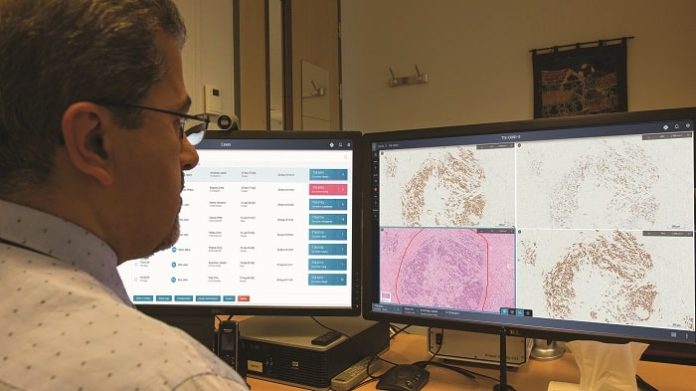Royal Philips, a global leader in health technology, announced it will introduce its latest advancements in digital pathology at the European Congress of Pathology 2020 virtual event, Dec. 6-8. Building on its strong portfolio to support oncology clinical decision-making, Philips brings together the power of imaging, pathology, genomics and longitudinal data with insights from artificial intelligence, to empower clinicians to deliver clear care pathways with predictable outcomes for every patient.
Pathology is vital to healthcare delivery, with 70% of decisions affecting a person’s life involving a laboratory or pathology test [1]. However, with current resource shortages, the growing volume of complex requests, and workflow inefficiencies across systems and departments, pathology labs are facing major pressures on multiple fronts.
Rather than viewing oncology as many single moments of care, Philips envisions a continuous care pathway empowered by integrated solutions for oncology and pathology that help transform and enhance multi-disciplinary workflows, including the oncology tumor board process. Critical patient data is made visible for both oncologists and pathologists, which allows them to collaborate more efficiently, to drive the right care in the right sequence at the right time.
By taking a systems view across the imaging enterprise, Philips leverages the power of smart diagnostic technologies and advanced informatics to remove the obstacles standing in the way of optimized workflows. The newly released Philips IntelliSite Pathology Solution features a leading-edge user experience (UX), enhancing ease of use while helping streamline the imaging workflow in an automated digital solution. With this latest iteration, Philips connects healthcare systems to scale digital operations and improve efficiency in high volume scanning, stimulate collaboration and enable precision diagnosis.
Philips commitment to an open pathology platform
Philips IntelliSite Pathology Solution offers an open, scalable, and interoperable platform that supports flexibility in deployments of image analysis software tools, strengthening Philips commitment to the Open Pathology platform. Other software tools allow developers and researchers to work with data natively in the iSyntax format for core research and algorithm development, enabling collaboration for education and the creation of third-party applications.
“A precise diagnosis informs the patient’s care pathway progress, from screening and diagnosis to treatment, monitoring, assessment, and the transition toward home care,” said Kees Wesdorp, Chief Business Leader Precision Diagnosis at Philips. ”Philips integrated solutions for oncology, including this latest enhancement in digital pathology, help empower the cancer care team to reach clinical treatment decisions based on richer dashboards, clinical images, reports, and structured patient data. The seamless integration of information into the oncology workflow will help improve the clinician experience and ultimately, patient outcomes.”
Philips participation in the Virtual ECP 2020 Congress
Philips will host a virtual presence during the 32nd European Society of Pathology Congress (ECP 2020) from December 6-8. ECP attendees will experience digital pathology imaging through demonstrations and webinars. Dr. Juan Retamero, a digital pathology professional, will share his experiences and vision on how digital pathology brings great potential to enhance patient care.
About Royal Philips
Royal Philips is a leading health technology company focused on improving people’s health and well-being, and enabling better outcomes across the health continuum – from healthy living and prevention, to diagnosis, treatment and home care. Philips leverages advanced technology and deep clinical and consumer insights to deliver integrated solutions. Headquartered in the Netherlands, the company is a leader in diagnostic imaging, image-guided therapy, patient monitoring and health informatics, as well as in consumer health and home care. Philips generated 2019 sales of EUR 19.5 billion and employs approximately 81,000 employees with sales and services in more than 100 countries.























